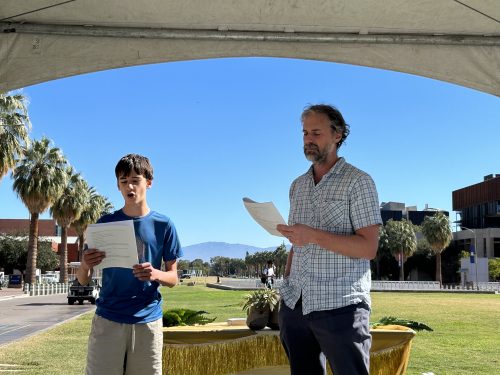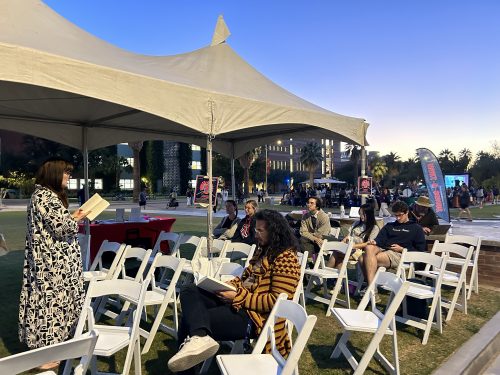
The UA Campus was buzzing as usual on Nov. 8, save for a two-peaked tent where classicists
cradled the spine of Homer’s “Odyssey.”
In 10-minute increments, they completed a non-stop 11-hour reading of this ancient poem —
translated by Emily Wilson — at a volume so intimate you had to tuck under the tent to hear it.
The Homerathon, an annual event presented by Eta Sigma Phi (the Classics Honors Society), the
Department of Religious Studies and Classics and the College of Humanities, featured classics
students and teachers reading page by page the 592 pages of Homer’s epic poem “Odyssey,”
chunked into 24 books.
Throughout that Wednesday, graduate students, professors and undergraduates delivered lines
theatrically as students on bikes and on foot strolled past. A few stopped to listen or gave curious
looks before continuing their commutes.
Readers switched off every 10 minutes, and every hour on the hour, volunteers delivered
presentations, everything from personal digressions to readings of other ancient excerpts, to
break up the readings.
The Homerathon readers, made up of anywhere from five to two dozen people at a time, were
sitting in two dozen white chairs, and while they anxiously awaited their turns, they studied
Greek vocabulary or exchanged friendly greetings. As the day elapsed, listeners moved their
chairs to avoid the midday sun.

Nicholas Kaplan, a second-year UA student double majoring in information science and classics,
was one of four students who stayed until the dark hour of 7:30 p.m. to complete the reading of
Homer’s famous poem. As the four students rotated reading the remaining 37 pages, the annual
SlutWalk highlighting victim blaming and rape culture in the U.S. started just across the
walkway.
“Pound Town” by Sexyy Red and Tay Keith resounded from event speakers while the
undergraduates maintained their poetic lines of Homer. But even they couldn’t help themselves
from dancing and giggling along to the hip-hop beats as they inched closer to the end of Homer’s
ancient text.
“It’s Homerathon x SlutWalk, the crossover we needed,” joked Ruby Staczek, president of Eta
Sigma Phi.
This was the Classics major’s second year helping the honor society organize the Homerathon.
Staczek said she was first drawn to study classics when she read Plato’s “Republic” in high
school. In college, she took an ancient philosophy class and discovered a desire to learn ancient
languages and study the nuances lost in translation.
“Sometimes when it’s 12 a.m. and I’m sitting studying my Greek I’ll be like, ‘I won’t be able to
speak this, it’s a dead language’,” Staczek said. “But then there’ll be those moments where I’m
reading a famous passage in Homer and I understand why I’m putting all these hours into a
language that I won’t be able to speak. I still think there’s a lot to get out of it.”
University of Arizona Associate Professor Robert Groves, who teaches Greek and Latin
literature, said that this all-day study of Homer is celebratory but isn’t meant to position Greco-
Roman culture above other facets of classical literature.
“One of the reasons people should care about classics is because it has been so formative for so
many parts of the world,” said Groves, who has been studying classics for over 25 years. “The
Greeks and Romans put out ideas that have been chewed on and reinterpreted over the millennium
in Europe, Africa, Asia that help explain why the world is how it is today.”
“It’s a way of understanding the way the world works, understanding the way that humans fit into
the world and of digesting those things in a really fascinating, robust way,” he added.
Kaplan said he wished there was more attention on the vastness and nuance of what is bound by
classics. Outside of Greco-Roman study, it includes Egypt, Persia and other ancient civilizations.
“It’s a very challenging field of study,” Kaplan said. “It’s fun for me, but the liberal arts aren’t
necessarily these easy, cop-out things. I’m learning a language that’s 2,500 years old.”
The UA Classics Department offers major emphases in Classical Civilizations and Classical
Languages. Learn more at classics.arizona.edu.
